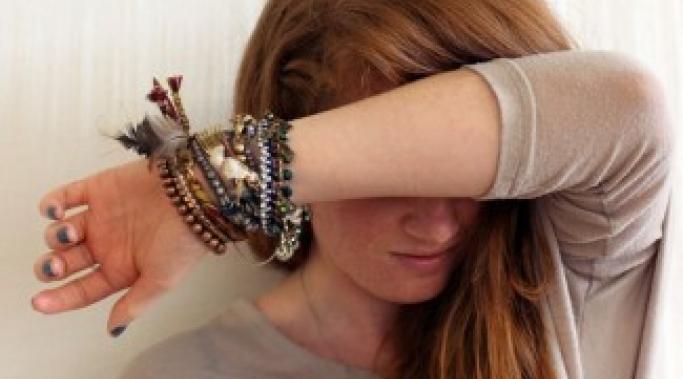Blogs
I woke up and automatically started putting on my bracelets before I realized what I’d promised myself I would do. At first, as I started taking them off, I thought maybe I wouldn’t partake in this experiment. However, I knew that if I didn’t at least try to make it through the day with nothing on my wrists, I’d feel as if I’d disappointed myself.
So, I took the bracelets off.
I did not like how it felt wearing nothing on my self-harm scars on my wrists. First of all, I realized how awful my tan lines were from wearing them on a daily basis. That, at least, made me laugh away some anxiety. I felt as though I was naked and that I needed to hide myself before my self-injury scars were noticed. In truth, it was only a big deal to me. But the big deal did make me feel uncomfortable throughout day.
The most prevalent question I receive from my Bipolar Babe peer support group participants is, “I met a wonderful guy/girl and she/he wants to take me out on a date, so do I tell them that I have a mental illness?” It’s a valid question and a concern that many people have right from the start, with good reason. It can be scary telling someone, anyone, for the first time that you have a mental illness due to the stigma that exists in society. In my personal experience, and hearing stories from others, mental health stigma and intimate relationships can spell doom and gloom, or they can provide a positive platform for empowerment and honesty.
I never saw my alcoholism coming. I grew up in a supportive, loving family and was always a bright and high-achieving child. I also had obsessive compulsive disorder (OCD, an anxiety disorder) from a young age, although I didn’t know what that was for some time. In high school I was very active in my OCD and restricted eating. I didn’t have time or energy for dating or drinking. I had relatives in rural Oregon who were methamphetamine users and I vowed I would never touch that stuff - but alcohol, I figured, was innocuous. After all, I thought, everybody drinks. I had my first drink of alcohol toward the end of my freshman year of college, and it was a nightmare pretty much right out of the gate.
Feeling confident and comfortable in a swimsuit isn't impossible. Bikini body image boosters and self-confidence tips will make you feel confident hitting the beach this summer.
Whether you currently self-harm or haven’t hurt yourself in years, visible self-injury scars and marks can still bring forward insecure emotions. Some people may use makeup to cover up marks and many others use bracelets or long sleeves as a safety shield. You become so comfortable hiding your self-harm that when you are asked not to wear or do those things, you grow anxious.
It’s completely normal to feel uncomfortable when breaking away from something you’re used to. Routines are made to keep our lives on track, but sometimes it is okay to step off of the line for a moment and change things up.
How about, for one day, you don’t hide your marks? That’s definitely changing things up.
Anxiety can be so overwhelming. Insidiously, it sometimes overtakes our entire being. A worry, an obsessive thought, or a fear creeps into the mind. Sometimes we notice it, and our anxiety kicks into overdrive. Other times, our anxiety kicks into overdrive before we fully notice the worry, thought, or fear. Either way, anxiety symptoms choke us physically, cognitively, and emotionally. We feel defeated. Yes, we feel defeated; however, we aren't actually defeated.
The other day I saw Get On Up, the James Brown biopic. One of the underlying themes in the film is how our personal histories can help create a kind of dysfunctional aloneness, separating us from the very people and experiences we need the most to thrive emotionally. This reminded me of the experience of depression, how the disease can create a feeling of separateness and of chronic aloneness.
I am a people pleaser. It is nice to give people what they want and I enjoy taking part in their happiness.
Over the years, I have learned that I have to say “no.” As much as I love to please people, it isn't wise to give people everything they want. Sometimes it isn't in their best interest and sometimes it isn't in mine. As someone with an anxiety disorder, it often makes me anxious when I say “no.”
I've been having a horrible time with anxiety. It still affects almost every area of my life. And although I've certainly gotten lots better at coping, my anxiety seems to be developing a new wrinkle: walking around feeling so alienated from the world that nothing feels real.
Technology is a tool, and like any tool it can be used for either constructive or destructive purposes. When it comes to focus and productivity, it’s wise to embrace all the tools at your disposal when you have adult attention deficit/hyperactivity disorder (ADHD).










I believe she will only be able to rid herself of her demons, and hopefully her BPD as well, when she's ready to confront the abuse of her father. If she can put the blame where it belongs, she may stop projecting that victim/perpetrator cycle on the present men in her life. These demons are a metaphor for the purgatory she has created for herself. That reality has consequences in the real world, but it need not be real in the tangible sense. Exorcising her demons will require the expenditure of real physical energy and probably the destruction of aspects of her personality. If this ever happens, and it's possible but not probable, then these demons will evaporate. They are only as real as one's personality is real. In short, reality is not the question, it's what you make of the things you feel to be real.